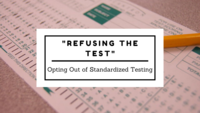 Snapshot: A school principal is asked to respond to growing numbers of parents opting their children out of state tests. How should she balance these parents’ concerns with other parent viewpoints supporting assessment, her own professional obligations, as well as with district and state accountability pressures?
Snapshot: A school principal is asked to respond to growing numbers of parents opting their children out of state tests. How should she balance these parents’ concerns with other parent viewpoints supporting assessment, her own professional obligations, as well as with district and state accountability pressures?
Case Description: Through widespread “opt-out” efforts over the past several years, parent and student activists have pressured school districts, states, and the federal government to reconsider the extent and limits of state-mandated assessments. This case study focuses on the ethical questions this issue poses for parents, teachers, school leaders and policymakers. That is: what values are at stake when parents decide to opt children into or out of state assessments? How might parents’ decisions relate to other public goals for education, including equal opportunity?
“Refusing the Test” portrays a school principal who is grappling with these questions, as the issue of opting out divides her school community. “Cora Lewin” is the principal of a K-8 school located in a rapidly gentrifying neighborhood of Denver, Colorado. The changes in her neighborhood have also brought in new families to the school, many of whom have concerns with standardized testing and high-stakes accountability reforms in the district. But opinion is divided about testing and accountability; some parents--and at least some teachers--remain supportive of year-end assessments. Facing a new wave of “opt outs,” Principal Lewin must consider how to respond to these parents’ concerns, while also balancing her responsibility to other members of her school community and her obligations to her school district. In doing so, she offers a closer look at the competing interests and values in recent controversies about standards and assessment. In effect,
This case is designed to help school and district leaders, parents and students discuss contentious issues of standards, accountability and assessment. In particular, it may be of interest to school and parent groups seeking to discuss the place of testing in public education, as well as those interested in educational policy and accountability-based reforms.
Abbreviated Case:
- For groups short on time, please check out this abbreviated version of the case.
Additional Resources:
-
This article, by Ashley Jochim and Patrick McGuinn, describes why many states are moving away from standardized tests aligned to Common Core, and provides an overview of the politics of growing opposition to the CCSS.
-
Some of the earliest criticisms of the opt out movements were posed by civil rights groups, who argued that opting out undermines the public value of collecting quality assessment data for all students. Organized by the Leadership Conference on Civil and Human Rights, this May 2015 press release, “Civil Rights Groups: ‘We Oppose Anti-Testing Efforts’,” outlines some of their concerns.
-
For more on opting out and issues of race, please see this 2016 Think Progress article, “The Whitewashing of The Opt-Out Movement."
-
To better understand some of the concerns of parents opting out, this 2016 study, “Who opts out and why?” provides one snapshot (Pizmony-Levy & Saraisky, 2016). For another view, United Opt Out National, a major opt out advocacy organization and network, also offers an overview of some of the concerns and goals of this movement on their webpage.
-
For some local context on opt out efforts in Colorado, this 2015 news article, “After widespread test protests last fall, opting out spread during spring exams,” offers an overview of the first large wave of opt out activism in the 2014-2015 school year.
-
In response to opt-out activism, a Colorado state bill, H.B. 1323, clarified that Colorado parents have the right to opt their children out of state standardized testing, without fear of penalties.

